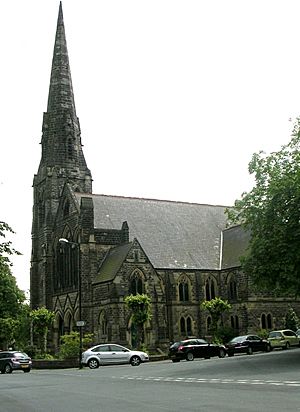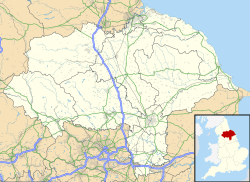Trinity Methodist Church, Harrogate facts for kids
Quick facts for kids Trinity Methodist Church, Harrogate |
|
|---|---|

Trinity Methodist Church
|
|
| 53°59′9.71″N 1°32′23.53″W / 53.9860306°N 1.5398694°W | |
| OS grid reference | SE 30251 54507 |
| Location | Harrogate |
| Country | England |
| Denomination | Methodist |
| Website | http://www.trinityharrogate.org.uk |
| Architecture | |
| Heritage designation | Grade II listed |
| Architect(s) | George Woodhouse |
| Completed | 11 April 1879 |
| Construction cost | £10,000 |
| Specifications | |
| Capacity | 736 persons |
Trinity Methodist Church in Harrogate, North Yorkshire, England, is a beautiful and historic building. It is recognized as a Grade II listed building, which means it's important and protected.
Contents
History of Trinity Methodist Church
Construction of the church began in October 1876. It officially opened its doors in April 1879. The church was designed in the Gothic style, which is known for its pointed arches and tall windows.
The building includes a porch with three sections and a main hall called a nave, also with three sections. It also has a special area called a sanctuary and parts that stick out on the sides, known as transepts.
Who Built It?
The main architect for the church was George Woodhouse. Many different skilled workers helped build it. Matthew Wilson was the mason, working with stone. Taylor and Son did the woodwork. John Baines was in charge of the roof slates. Morrell and Hartley were the painters. Walmisley installed the windows. Exley and Son provided the heating system.
In 1889, a tall tower and spire were added to the northwest side of the church. This made the building even more impressive.
Modern Updates
Between 2009 and 2011, the church underwent a big renovation project. This helped to update the building and keep it in good condition for future generations.
The Church Organ
Trinity Methodist Church has a large pipe organ. It was built in 1880 by a company called Forster and Andrews. This type of organ uses air blown through many pipes to make music.
The organ has three keyboards, called manuals. It was updated in 1923 by Brindley and Foster. It was updated again in 1949 by Henry Willis. You can find more details about this organ on the National Pipe Organ Register.
Past Organists
- George Frederick Naylor played the organ here from 1894 to 1897.
See Also
- Listed buildings in Harrogate (Stray Ward)
 | Toni Morrison |
 | Barack Obama |
 | Martin Luther King Jr. |
 | Ralph Bunche |


